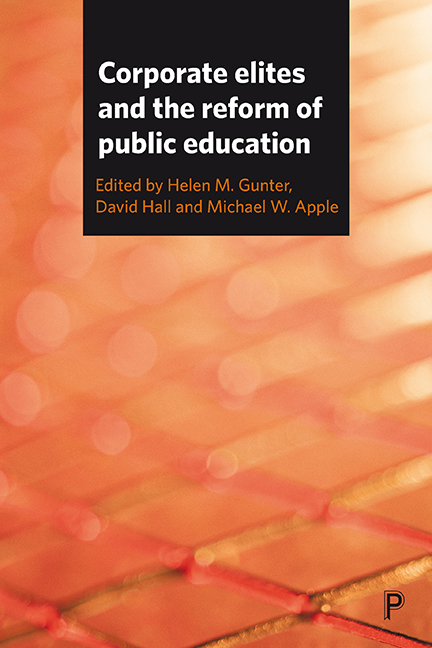Book contents
- Frontmatter
- Contents
- Foreword
- Notes on contributors
- Introduction: Scoping corporate elites and public education
- Part 1 Corporatised governance: system perspectives
- Part 2 Corporatised governance: provision perspectives
- Conclusion: The challenge of corporate elites and public education
- References
- Index
Conclusion: The challenge of corporate elites and public education
Published online by Cambridge University Press: 05 April 2022
- Frontmatter
- Contents
- Foreword
- Notes on contributors
- Introduction: Scoping corporate elites and public education
- Part 1 Corporatised governance: system perspectives
- Part 2 Corporatised governance: provision perspectives
- Conclusion: The challenge of corporate elites and public education
- References
- Index
Summary
Introduction
The primary research and critical analysis reported in this collection of essays has made a substantive contribution to the field of critical education policy as well as to democratic discourses, through undertaking and accessing fieldwork data and through thinking productively in order to scope and bring meaning to, the relationship between corporate elites and the reform of public education. Our goal in focusing on emerging forms of corporatised governance is not only to add to the growing body of work about the ideas, networks and strategies adopted by corporate elites, but also to reveal – and bring new perspectives to – how this has become extraordinarily ordinary. What our data and insights show is that there is an accepted normality to what is unfolding, where counter-narratives are difficult but not impossible to construct.
In this concluding chapter, we draw together key outcomes from the within-outside analysis, and consider what this means for the ongoing debates, realities and experiences of public education. Within this we put emphasis on what the reforms mean for ongoing research agendas and methodologies.
Mapping corporate elites and the reform of public education
We have set out to uncover and tell some important stories, and we have located those accounts within the wider context of critical education policy studies through drawing on analysis of global trends, the changing role of the nation state, together with the policy processes and the networks that underpin this. But the distinctive nature of the accounts that illuminate corporatised governance is that we have also shown what it actually means for people working in universities and schools, and how people are handling their often confused and contradictory location at the leading edge of corporate activity and influence – some are pushed off the edge into a void, some continue to struggle with what it means, and some leap to embrace attractive opportunities. Here we provide a summary of what our data and analysis are indicating regarding significant shifts in government, in educational institutions and professional practices, and in civil society.
Movement of educational issues from the public to the private domain
Our claim is that we are witnessing the increased dominance of the ‘private’ within privatisation through how educational issues are increasingly shifting to personal (rational? whimsical?) choice agendas. Corporate elites have both contributed to this shift and are beneficiaries of it.
- Type
- Chapter
- Information
- Corporate Elites and the Reform of Public Education , pp. 233 - 248Publisher: Bristol University PressPrint publication year: 2017

